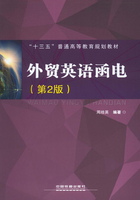
4.1 Relevant Knowledge About Offers
4.1.1 The definition of offer
An offer refers to conditions given by the seller or the buyer for making a contract.It can be given by either the seller or the buyer.If it is given by the seller,it is called a selling offer,but if it is given by the buyer,it is called a buying offer.The one,who volunteers to give conditions,is called the offeror.The one,who accepts the conditions,is called the offeree.
The conditions mainly include the name of the commodity,Art.No.,specification,quantity,price,packaging,terms of payment and delivery time,etc.Therefore,whenever you receive the inquiry you must make an offer and provide all the detailed information which is requested.
4.1.2 Classification of offer
In international trade,offers can be classified into two types:firm offers and non-firm offers.
1.Firm offers
A firm offer is one by which the offeror promises to sell particular goods at a stated price within a stated period of time.Once the firm offer has been accepted within the specified period,it cannot be withdrawn.A firm offer has binding force upon the offeror,ensuring that the content of the firm offer cannot be changed or revoked within the specific valid period.But after the valid time,the offer will become invalid.The offeror is no longer responsible for the obligations stipulated in the offer.Even if the offeree accepts the offer,the offeror has the right to refuse.The valid period of the firm offer is very important.Otherwise,it will be regarded as a non-firm offer.
The firm offer has two apparent features:
(1)All the terms and conditions in the offer must be complete and definite.It should include a specified quantity with complete specifications at a fixed price and under stipulated conditions.
(2)The validity must be clearly stated in the offer.
As to how long the validity is stipulated,it depends on the nature of the product and market conditions.Price-sensitive products such as cotton always have a short validity period because their prices fluctuate sharply while some products such as art and handicraft articles may have a longer validity because their prices are more or less stable.The common expression to be attached in a firm offer is:“We offer you firm subject to your reply reaching here before...o’clock,...,....”.This is a best wording because the word“here”has two meanings:the offerors’ place and local time.
2.Non-firm offers
A non-firm offer is usually indicated by means of sending catalogues,pricelists,proforma invoices and quotation sheets.It has no engagement for the offeror.That is,the offeror is free from any obligations and the offer can be changed,revised and even withdrawn at any time.
We can judge that the offers are non-firm ones according to the following three points:
(1)The offer is clearly marked“for reference”.
(2)Some major terms such as the validity are omitted/left out in the offer.
(3)There are some reserved statements in the offer such as:
①The offer is subject to change without notice.
②The offer is subject to the sellers’ final confirmation.
③The offer is subject to the goods being unsold.
④ The offer is subject to market fluctuations.
⑤ The offer is subject to prior sales.
⑥ This offer is subject to further discussion.
Why is a non-firm offer made and sent?Sending a non-firm offer has several considerations.The offeror simply wants to know whether the enquirer is a potential purchaser or not,whether the product is salable or not,or whether market chances are available or not.